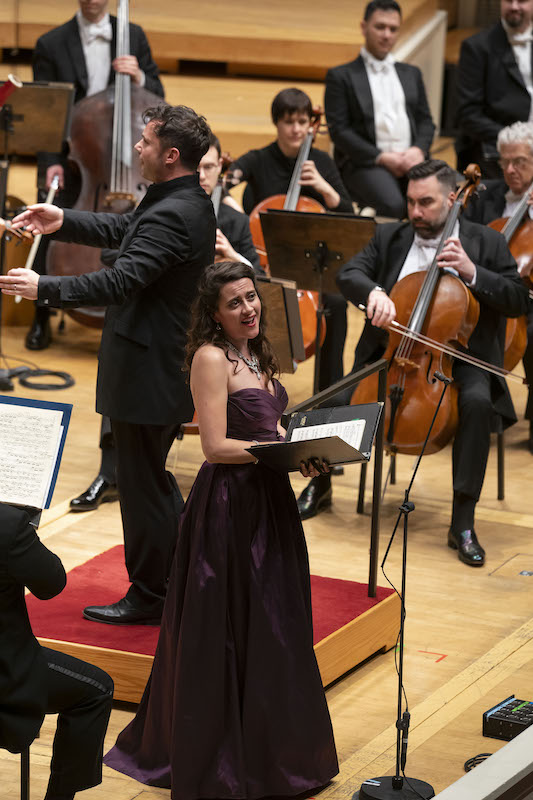Worthy is Matthew Halls’ “Messiah” in conductor’s impressive CSO debut

For a work as hugely popular as The Messiah, Handel’s ineradicable oratorio has only been performed at Chicago Symphony Orchestra subscription concerts four times. Fritz Reiner led a potted version in 1957 (just Part One and the “Hallelujah” chorus), followed by complete versions from Georg Solti in 1984, Peter Schreier in 2004 and Bernard Labadie in 2015.
But less widely known is that Messiah was a Chicago Symphony holiday standard from the orchestra’s earliest days. William L. Tomlins led the CSO’s first Messiah with the Apollo Chorus (then called Apollo Musical Club) on Christmas Day, 1891, just two months after the orchestra’s very first concerts. The CSO-Apollo Messiah collaboration continued almost every December for the next seven decades until 1964. The CSO also did four Messiah performances at the 1893 Colombian Exposition and several runouts over the years as well.
So, this week’s Messiah performances, led by Matthew Halls, come from a longer local Handel tradition than is apparent on the surface. And while perhaps not a Messiah for the ages, the English conductor made a largely impressive CSO debut, leading a worthy and stylish performance of Handel’s Christmas perennial Thursday night.
As is the current historically aware custom, the orchestra was slenderized to smallish chamber orchestra dimensions, though the CSO Chorus was at nearly full strength. Halls favored a fleet pace in the faster numbers as is the norm; conversely he also favored stately, sometimes extremely slow tempos in the recitatives and more inward arias—less convincing when a singer’s expressive intensity was insufficient to sustain the music at that kind of crawl.
The most consistent element came from the orchestra, whose members seemed to be enjoying themselves immensely with smiles aplenty. The CSO’s versatility is widely known, but in addition to playing with nimble vitality and bracing dynamism, they somehow managed to sound like a crack period-instrument band under Halls, with a nice touch of tangy asperity in the violins.
The most successful Messiahs tend to be those where Handel’s dramatic and theatrical moments are given free rein. The vocal quartet proved somewhat inhibited on that front, not always seizing their opportunities–and likely not helped by a late substitution for one of the soloists.
Amanda Forsythe possesses the kind of bright, piping voice suited for this music and showed impressive facility in the florid passages, not least her virtuosic runs through the coloratura of “Rejoice greatly” at Halls’ fast clip. Yet while her slender soprano is attractive, it’s decidedly straitened in tonal coloring. Forsythe seemed to be trying to make up the balance with interpolated grace notes and mini-cadenzas in her arias, not always to the music’s benefit. Her spinning out of show-offy high notes in a when-worlds-collide “He shall feed his flock” felt anachronistic and at odds with the pastoral peace and simplicity of the duet.
Mezzo Sasha Cooke offered some grace notes as well but hers were rendered with greater taste and sensitivity to the musical moment. At times, the mezzo’s lower range tended to fade away, but for the most part she offered inspired singing and an assured oratorio style. Cooke brought a full-bodied tone and poised expression to “But who may abide?” and displayed fine agility in the fast middle section. She likewise plumbed the elegiac, even despondent expression of “He was despised,” with sensitive singing and sympathy.
The reliable Nicholas Phan was the most consistent of the four soloists, making one wish that Handel had given the tenor more music. Phan invested all his moments with vital characterization, from the bristling bravura of “Ev’ry valley” to his compassionate “Behold, and see.”
David Govertsen filled in at the 11th hour Thursday night for ailing baritone Joshua Hopkins, and one was grateful to him for plugging the quartet gap on short notice. Still, even accounting for lack of rehearsal time, his arias sorely lacked dramatic point and authority, in music he has surely sung on previous occasions. The bass got lost in the score more than once, alarmingly so in “The trumpet shall sound.” (Mark Ridenour’s dazzling instrumental solo and peppery grace notes in that aria provided a highlight, firmly in the Bud Herseth tradition.)
Of course, Messiah is really a choral showpiece, and the CSO Chorus members made the most of their opportunities. There were moments of rhythmic haze and some lack of textural clarity in the early going, but Duain Wolfe’s ensemble went from strength to strength in Parts Two and Three.
The “Hallelujah” chorus was aptly rousing with nearly the entire hall standing (in that decidedly odd tradition, originating from royal subservience). But it was the singers’ vivid and varied characterization of the other choruses that were equally striking: the plaintive sadness of “Surely he hath borne our griefs,” the harsh ridicule of “He trusted in God,” and the uninhibited rejoicing of “The Lord gave the word.”
The final chorus “Worthy is the Lamb” proved just as exciting as the “Hallelujah,” with Halls building the interweaving choral and orchestral lines into a majestic and sonorous coda with cumulative dramatic impact.
The program will be repeated 1:30 p.m. Friday, 8 p.m. Saturday and 2 p.m. Sunday. cso.org; 312-294-3000.
Posted in Performances





Posted Dec 10, 2020 at 9:53 pm by Bill Weeden
This performance, which I heard broadcast on the Rochester N.Y. PBS station WXXI, was indeed magnificent. Could you please tell me if it is available on CD for purchase?